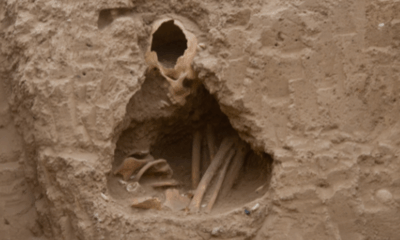Science
Archaeologists Uncover Evidence of Cannibalism in Neolithic Spain

Archaeologists excavating the El Mirador cave in Spain have unearthed a grim collection of human bones, leading to new insights regarding violence and conflict during the Neolithic period. This discovery, characterized by clear evidence of cannibalism, includes human bite marks and knife cuts, as well as fractures consistent with marrow extraction. A study published in the journal Scientific Reports details how the remains show signs of having been boiled, indicating a gruesome culinary practice.
The human remains, belonging to at least 11 individuals, date back between 5,573 and 5,709 years. Among them were children, suggesting that the victims may have been part of a single family who met a violent end. Researchers theorize that these individuals were killed, skinned, and subsequently consumed by their contemporaries. The event likely occurred during the final stages of the Neolithic, a period that lasted until approximately 2000 BC.
Conflict, Not Ritual
Researchers suggest that the cannibalism was not ritualistic or born out of famine but rather a response to conflict within and between communities. Francesc Marginedas, a co-author of the study and an evolutionary anthropologist at the Institut Català de Paleontologia Miquel Crusafont, emphasized this point, stating, “This was neither a funerary tradition nor a response to extreme famine.” He noted that the evidence suggests a violent episode, likely resulting from disputes between neighboring farming communities.
Chemical analysis of the bones provided crucial information about the victims, revealing that they were local residents, possibly a nuclear or extended family. Ages ranged from seven to fifty years old, indicating a swift and brutal attack that resulted in multiple deaths over a short time frame.
Insights into Human Nature
The findings shed light on the darker aspects of human interactions during the Neolithic era. Co-author Antonio Rodríguez-Hidalgo, an archaeologist and researcher at IPHES, remarked on the inherent nature of conflict, stating, “Conflict and the development of strategies to manage and prevent it are part of human nature.” He explained that even in societies with less social stratification, violent episodes can emerge, leading to extreme responses such as cannibalism.
This discovery not only enhances our understanding of Neolithic life but also raises questions about the social dynamics of early human communities. It highlights the impact of conflict on survival strategies and the ultimate consequences of violence among groups during a formative period in human history. The research offers a rare glimpse into the complexities of human behavior, reminding us that even in ancient times, the fight for resources and survival could lead to unimaginable acts.
-

 Entertainment2 months ago
Entertainment2 months agoAnn Ming Reflects on ITV’s ‘I Fought the Law’ Drama
-

 Entertainment3 months ago
Entertainment3 months agoKate Garraway Sells £2 Million Home Amid Financial Struggles
-

 Health2 months ago
Health2 months agoKatie Price Faces New Health Concerns After Cancer Symptoms Resurface
-

 Entertainment2 months ago
Entertainment2 months agoCoronation Street’s Carl Webster Faces Trouble with New Affairs
-

 Entertainment2 months ago
Entertainment2 months agoWhere is Tinder Swindler Simon Leviev? Latest Updates Revealed
-

 Entertainment3 months ago
Entertainment3 months agoKim Cattrall Posts Cryptic Message After HBO’s Sequel Cancellation
-

 Science3 weeks ago
Science3 weeks agoBrian Cox Addresses Claims of Alien Probe in 3I/ATLAS Discovery
-

 Entertainment2 months ago
Entertainment2 months agoOlivia Attwood Opens Up About Fallout with Former Best Friend
-

 Entertainment3 months ago
Entertainment3 months agoMarkiplier Addresses AI Controversy During Livestream Response
-

 Entertainment3 months ago
Entertainment3 months agoMasterChef Faces Turmoil as Tom Kerridge Withdraws from Hosting Role
-

 Entertainment4 months ago
Entertainment4 months agoSpeculation Surrounds Home and Away as Cast Departures Mount
-

 World2 months ago
World2 months agoCole Palmer’s Mysterious Message to Kobbie Mainoo Sparks Speculation





















